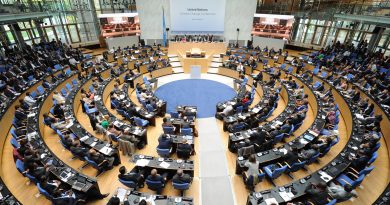Trump and Musk’s DOGE gut USAID, Millions of Lives Hang in the Balance
Andrew Travis
Staff Writer
As part of President Donald Trump’s broader aim to downsize the federal government, one of his first orders of business following his inauguration was to place a freeze on all United States aid abroad. On January 24, NPR reports that the State Department issued a ‘stop work’ order to all international aid programs reliant on U.S. funding.
The executive order by Trump directly targeted the United States Agency for International Development (USAID), which funds projects in over 120 countries, providing global humanitarian assistance such as disease prevention in Sub-Saharan Africa, hospital support in war-torn Syria, and demining efforts in Southeast Asia, according to The Associated Press. According to President Trump, Reuters reports, the pause was put in place to review the aid contributions of the U.S. and see if they align with his “America First” foreign policy. According to another NPR article, President Trump accused USAID of “widespread waste” in a recent press conference.
Before halting its operations, USAID possessed a foreign aid budget of over $40 billion for the year 2023, which is all but frozen, while Elon Musk’s “Department of Government Efficiency” (DOGE) is actively working to shutter the agency. In a post on X, formerly Twitter, Musk claims: “USAID is a criminal organization. Time for it to die.” According to Forbes, neither Musk nor President Trump has provided evidence for their claims regarding USAID. CNN reports that two top security officials at USAID were put on administrative leave after denying members of DOGE access to the agency’s internal systems.
In the initial aftermath of the freeze, Secretary of State Marco Rubio initially gave an exemption for emergency food assistance. Reuters reports that the exemption was changed to a waiver for “life-saving” humanitarian assistance. However, it left many humanitarian organizations that depend on USAID for funding unsure of the future of their projects. Despite the provision to allow life-saving aid work to continue, The New York Times reports that the programs that have received the waivers have not been able to continue the work because the program that disburses aid funds has been “inaccessible for weeks.” This issue affects agencies like the President’s Emergency Plan for Aids Relief (PEPFAR), which has halted HIV treatment, testing, and prevention services in 50 countries, according to BBC.
According to a lawsuit filed by the American Foreign Service Association and the American Federation of Government Employees against the Trump administration, more than 1,000 employees were locked out of their computer accounts, even those in war zones. Al Jazeera reports that USAID employees ordered to return from their positions in the Democratic Republic of the Congo had to escape as violent protests and demonstrations against the Rwandan-backed M23 offensive filled Kinshasa in late January. A website tracking lost jobs since the stop work order on January 24, USAID Stop Work, reports that over 11,000 jobs were lost between USAID employees and development contractors.
Since its inception under President Kennedy in 1961, USAID has functioned as an instrument of the U.S.’s soft power, which President Trump is jeopardizing by effectively shutting down the U.S.’s foreign assistance. There are concerns that the absence of U.S. aid in regions around the world will create opportunities for rival powers eager to gain the soft power influence that the U.S. holds today. For example, in 2015, USAID played a role in the negotiations for the opening of the U.S. military base Camp Lemonnier, the U.S.’s only permanent military base in Africa. As part of the negotiation package, The Washington Post reports that Djibouti President Ismaïl Omar Guelleh requested a USAID project to address unemployment in the country.
Between 2016 and 2021, USAID implemented a development project to improve Djiboutian workforce readiness by strengthening job placement, retention, and advancement services. The project directly influenced the successful renegotiation of the military base lease—an example of the kind of influence and soft power that the Trump administration and DOGE risk losing with their dismantling of USAID and the U.S. aid mandate.
There are challenges to President Trump’s attack on USAID. The New York Times reports that on February 13, Federal Judge Carl Nichols of the U.S. District Court for the District of Columbia filed a restraining order to stall the efforts of the Trump administration. Rulings on the lawsuits brought forward by groups like the American Bar Association and USAID contractors are waiting to be ruled on in the coming weeks. Meanwhile, the USAID website remains dormant as the legal battle over the future of United States development and humanitarian work heats up.
Image courtesy of Getty Images.


